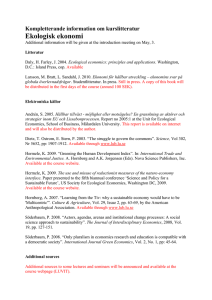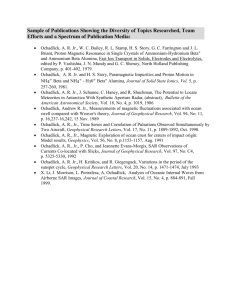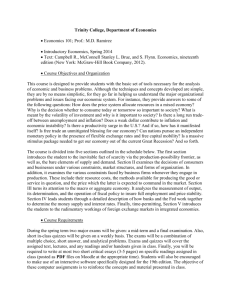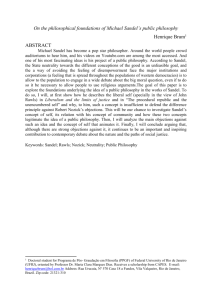Seminar: Ethics, Economics, and Law
advertisement
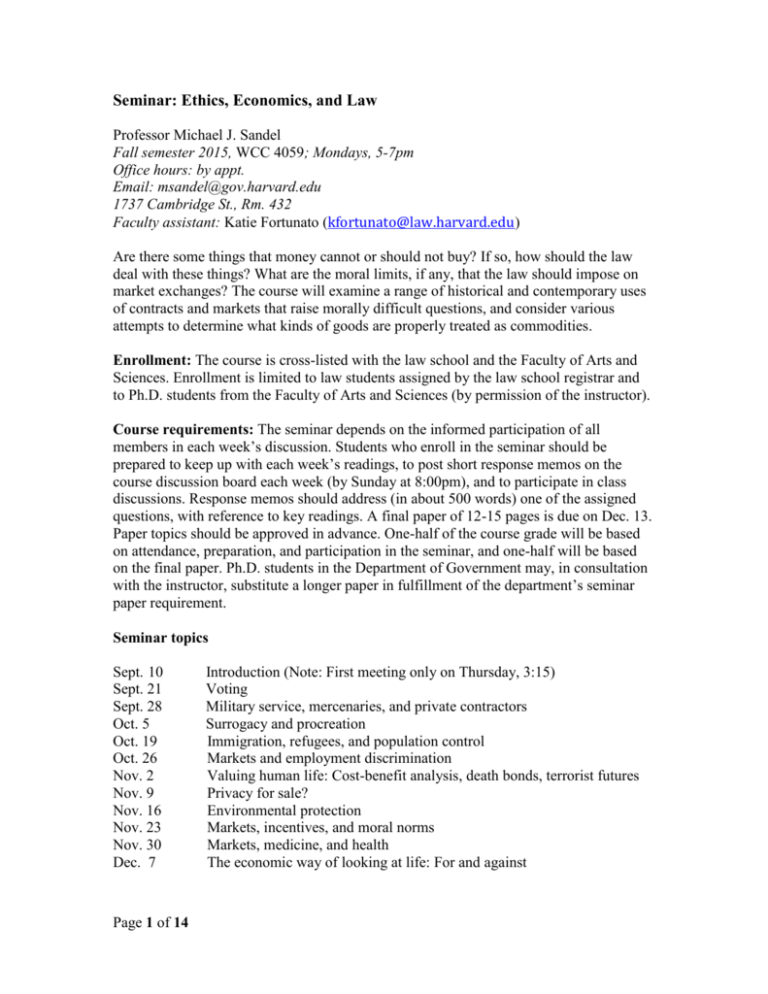
Seminar: Ethics, Economics, and Law Professor Michael J. Sandel Fall semester 2015, WCC 4059; Mondays, 5-7pm Office hours: by appt. Email: msandel@gov.harvard.edu 1737 Cambridge St., Rm. 432 Faculty assistant: Katie Fortunato (kfortunato@law.harvard.edu) Are there some things that money cannot or should not buy? If so, how should the law deal with these things? What are the moral limits, if any, that the law should impose on market exchanges? The course will examine a range of historical and contemporary uses of contracts and markets that raise morally difficult questions, and consider various attempts to determine what kinds of goods are properly treated as commodities. Enrollment: The course is cross-listed with the law school and the Faculty of Arts and Sciences. Enrollment is limited to law students assigned by the law school registrar and to Ph.D. students from the Faculty of Arts and Sciences (by permission of the instructor). Course requirements: The seminar depends on the informed participation of all members in each week’s discussion. Students who enroll in the seminar should be prepared to keep up with each week’s readings, to post short response memos on the course discussion board each week (by Sunday at 8:00pm), and to participate in class discussions. Response memos should address (in about 500 words) one of the assigned questions, with reference to key readings. A final paper of 12-15 pages is due on Dec. 13. Paper topics should be approved in advance. One-half of the course grade will be based on attendance, preparation, and participation in the seminar, and one-half will be based on the final paper. Ph.D. students in the Department of Government may, in consultation with the instructor, substitute a longer paper in fulfillment of the department’s seminar paper requirement. Seminar topics Sept. 10 Sept. 21 Sept. 28 Oct. 5 Oct. 19 Oct. 26 Nov. 2 Nov. 9 Nov. 16 Nov. 23 Nov. 30 Dec. 7 Page 1 of 14 Introduction (Note: First meeting only on Thursday, 3:15) Voting Military service, mercenaries, and private contractors Surrogacy and procreation Immigration, refugees, and population control Markets and employment discrimination Valuing human life: Cost-benefit analysis, death bonds, terrorist futures Privacy for sale? Environmental protection Markets, incentives, and moral norms Markets, medicine, and health The economic way of looking at life: For and against Voting Is it always wrong to buy or sell votes? If it is wrong to pay people to vote a certain way, is it also wrong to pay them to vote (however they cast their ballot) or not to vote? Is there a distinction between buying votes and making campaign promises that give voters an economic incentive to vote a certain way? What, if anything, is the difference between selling one’s vote and voting according to one’s economic interest? Readings Timothy Eagan, “Hedging Bets on Democracy, Casinos Offer Cash to Voters,” THE NEW YORK TIMES, August 18, 1995. “Old Hat in New Jersey: Electoral Fraud,” THE ECONOMIST, November 20, 1993. Pamela Karlan, “Not by Money but by Virtue Won? Vote Trafficking and the Voting Rights System,” 80 Virginia Law Review, October 1994, pp. 1455-1475. John Ferejohn, “It’s Not Just Talk,” 85 Virginia Law Review, Nov. 1999, sec. 1, 3, 5. Anthony Downs, An Economic Theory of Democracy (Harper & Row, 1957), pp. 3, 2235, 36-38, 49-50, 185-194. Rousseau, The Social Contract, Book III, ch. 15, and Book IV, ch. 1. Michael J. Sandel, “Votes for Sale,” The New Republic, November 18, 1996. Greg Mankiw and Michael Sandel, “On Selling Votes,” Greg Mankiw’s Blog, November 21, 2007. http://gregmankiw.blogspot.com/2007/11/on-selling-votes.html Brown v. Hartlage, 456 U.S. 45 (1982) Naron v. Prestage, 469 So.2d 83 (Miss. 1985) Page 2 of 14 Military service, mercenaries, and private contractors Should military service be allocated by the labor market or by conscription? Is there a principled distinction between a paid (“volunteer”) army and an army of mercenaries? On what grounds, if any, are mercenary armies objectionable? Is the growing use of private military contractors objectionable? Readings David M. Kennedy, “The Best Army We Can Buy,” New York Times, July 25, 2005. Charles Rangel, “Military Conscription: Mandatory Service Might Make Hawks Think Twice,” Atlanta Journal-Constitution, January 14, 2003. Richard A. Posner, “An Army of the Willing,” The New Republic, May 19, 2003. William A. Galston, “A Sketch of Some Arguments for Conscription,” Philosophy & Public Policy Quarterly, vol. 23, no. 3 (Summer 2003), pp. 2-7. Robert K. Fullinwider, “Conscription—No,” Philosophy & Public Policy Quarterly, vol. 23, no. 3 (Summer 2003), pp. 8-13. P. W. Singer, “Outsourcing War,” Foreign Affairs, Mar/April 2005, vol. 84, pp. 119-132. Michael Walzer, “Mercenary Impulse,” The New Republic, March 12, 2008. Doug Brooks and Gaurav Laroia, “Privatized Peacekeeping,” National Interest, Summer 2005. Deborah Avant, “Mercenaries,” Foreign Policy, July/August 2004, pp. 20-28. “Whose law must mercenaries obey?” Economist, August 23, 2008, vol. 387, Carlos Zarate, “The Emergence of a New Dog of War: Private International Security Companies, International Law, and the New World Disorder,” Stanford Journal of International Law, vol. 34, 1998. Page 3 of 14 Surrogacy and procreation Should commercial surrogacy be legally permissible? Should surrogacy contracts be legally enforceable? Is surrogacy morally analogous to baby-selling? Can a case be made for using markets to allocate children? Assess the arguments for and against surrogacy advanced by Judge Sorkow (Superior Court, Chancery Division) and Judge Wilentz (Supreme Court of N.J.) in the Baby “M” cases. Is the use of cash incentives for sterilization morally objectionable? Readings Lorraine Ali and Raina Kelley, “The Curious Lives of Surrogates,” Newsweek, April 7, 2008. Amelia Gentleman, “India Nurtures Business of Surrogate Motherhood,” New York Times, March 19, 2008. Cheryl Miller, “Outsourcing Childbirth,” Wall Street Journal, April 25, 2008. Elizabeth M. Landes and Richard A. Posner, The Economics of the Baby Shortage,” 7 JOURNAL OF LEGAL STUDIES (1978). Richard A. Posner, “The Regulation of the Market in Adoptions,” 67 BOSTON UNIVERSITY LAW REVIEW (1987). Margaret Jane Radin, “What, if Anything, Is Wrong with Baby Selling?” 26 PACIFIC LAW JOURNAL (1995). Elizabeth Anderson, “Is Women’s Labor a Commodity?” in VALUE IN ETHICS AND ECONOMICS, pp. 168-189. Michael J. Sandel, “The Baby Bazaar,” THE NEW REPUBLIC, October 20, 1997. In re Baby M, 217 N.J. Super. 313 (1987). Matter of Baby M, 537 A.2d 1227 (N.J. 1988). Kevin Tuininga, “The Ethics of Surrogacy Contracts and Nebraska’s Surrogacy Law,” Creighton Law Review, Feb. 2008, Vol. 41 Issue 2, p185-206. Richard A. Epstein, “Surrogacy: The Case for Full Contractual Enforcement,” Virginia Law Review, vol. 81, Nov. 1995. Cecilia M. Vega, “Sterilization Offer to Addicts Reopens Ethics Issue,” New York Times, January 6, 2003. Michelle Cottle, “Say Yes to CRACK,” New Republic, August 23, 1999, pp. 16-18. Page 4 of 14 Immigration, refugees, and population control Should countries sell the right to immigrate? Should market mechanisms play a role in allocating responsibilities for taking in refugees? What are the best arguments for and against a system of tradable obligations to admit refugees? Are tradable procreation permits objectionable as a means of population control? Gary Becker, “Sell the right to immigrate”, The Becker-Posner Blog, Feb 21, 2005. http://www.becker-posner-blog.com/archives/2005/02/sell_the_right.html Peter Schuck, “Share the Refugees,” New York Times, August 13, 1994. Peter Schuck,“Refugee Burden-Sharing: A Modest Proposal,” Yale Journal of International Law 22 (2), 1997, 243–297. (Also ch.12 in Schuck, Peter. Citizens, Strangers, and In-Betweens: Essays on Immigration and citizenship, Westview Press, 1998.) Eric Cavallero, “An immigration-pressure model of global distributive justice”, Politics, Philosophy & Economics, 5(1) 2006, 97–127. Kenneth Boulding, The Meaning of the Twentieth Century. New York: Harper & Row, 1964. (ch. VI: The Population Trap”, 121-136) David de la Croix and Axel Gosseries, “Population Policy through Tradable Procreation Entitlements,” (October 2006). CORE Discussion Paper No. 2006/81 Available at SSRN: http://ssrn.com/abstract=949148 David De La Croix and Axel Gosseries, “Procreation, Migration and Tradable Quotas” (November 2006). CORE Discussion Paper No. 2006/98 Available at SSRN: http://ssrn.com/abstract=970294 Further reading Simon, Julian. The Economic Consequences of Migration in the United States, Oxford: Blackwell, 1989, ch. 16, http://www.juliansimon.com/writings/Immigration/ Page 5 of 14 Markets and Employment Discrimination Can employment discrimination be justified on grounds of satisfying the preferences of customers? If so, under what circumstances? Does it make a difference whether the discrimination involves race or gender? Are there some consumer preferences that are morally illegitimate for a business to serve? If so, how should the law respond? Steven Greenhouse, “Going for the Look, but Risking Discrimination,” New York Times, July 1, 2003. Robert Barro, “So You Want to Hire the Beautiful. Well, Why Not?,” Business Week, 03/16/98. Karyn Spellman, “Hooters guys? No way...,” The Boston Globe, November 16, 1995. Peter Passell, “An Ugly Subject: The Prejudice Against Hiring Homely People,” The New York Times, January 27, 1994. Andrea Gerlin, “The Male Gynecologist: Soon to be Extinct?,” THE WALL STREET JOURNAL, February 7, 1996. Diaz v. Pan American World Airways (1971). Wilson v. Southwest Airlines (1981). Robert Post, “Prejudicial Appearances: The Logic of American Discrimination Law,” California Law Review, Jan. 2000, Vol. 88. Kimberly A. Yuracko, “Private Nurses and Playboy Bunnies: Explaining Permissible Sex Discrimination,” California Law Review, Jan. 2004, Vol. 92, pp.149-213. Further reading Richard A. Epstein, Forbidden Grounds: The Case Against Employment Discrimination Laws, pp. 283-309. Deborah L. Rhode, Justice and Gender, pp. 92-107. Page 6 of 14 Valuing human life I: Cost-benefit analysis Is it a valid objection to cost-benefit analysis that human life is “priceless,” or is placing a monetary value on life unavoidable in making rational policy choices? How should the value of life be determined for purposes of environmental, health, and safety regulations? W. Kip Viscusi, “A Price on Your Head,” Forbes, January 7, 2008. Frank Ackerman and Lisa Heinzerling, Priceless: On Knowing the Price of Everything and the Value of Nothing (New Press, 2004), ch. 4, 8. Cass R. Sunstein, “Cost-Benefit Analysis and the Environment,” Ethics, vol. 115, January 2005, pp. 351-385. W. Kip Viscusi, “The Value of Life in Legal Contexts: Survey and Critique,” American Law and Economics Review, vol. 2 (2000), pp. 195-222. W. Kip Viscusi, “The Value of Life,” in Steven Durlauf and Lawrence Blume, ed., The New Palgrave Dictionary of Economics, 2nd Edition. (London: Macmillan, 2007). Eric A. Posner and Cass R. Sunstein, “Dollars and Death,” 72 University of Chicago Law Review, Spring 2005, pp. 537-598. Amy Sinden, “Cass Sunstein’s Cost-Benefit Lite: Economics for Liberals,” 29 Columbia Journal of Environmental Law, 2004, pp. 191-241. Elizabeth Anderson, Value in Ethics and Economics (Harvard Univ. Press, 1993), ch. 9. Page 7 of 14 Valuing human life II: Death bonds, life insurance, terrorist futures markets Is it objectionable to profit from death, or to bet on when someone will die? What is the moral status of death bonds, viatical contracts, internet death pools, life insurance, and terrorist futures markets? Michael Sandel, What Money Can’t Buy: The Moral Limits of Markets, ch. 4. Bradley Graham and Vernon Loeb, “Pentagon Drops Bid For Futures Market; Investors Could Bet on Terrorism, Coups,” Washington Post, July 30, 2003. James Surowiecki, “Damn the Slam PAM Plan!,” Slate Magazine, July 30, 2003. Adam Meirowitz and Joshua A. Tucker, “Learning from Terrorism Markets,” Perspectives on Politics, Vol. 2, No. 2 (Jun., 2004), pp. 331-336. Matthew Goldstein, “Profiting from Mortality,” Business Week, July 30, 2007, pp.44-51. Ellen E. Schultz and Theo Francis, “Valued Employees--Worker Dies, Firm Profits,” Wall Street Journal, April 19, 2000. Charles Duhigg, “Late in Life, Finding a Bonanza in Life Insurance,” New York Times, December 17, 2006. Viviana A. Zelizer, Morals and Markets: The Development of Life Insurance in the United States (Columbia University Press, 1979), pp. 61-65, 91-117. Page 8 of 14 Privacy for sale? Is there anything wrong with health insurers offering discounts to policy-holders who agree to wear Fitbits or other wearable devices that send data about exercise, diet, sleep, and other behavior to the insurance company? Should employers be allowed to make similar offers to their workers? Does it matter whether the employer gives bonuses for wearing the devices or imposes fines for not wearing them? Should auto insurers be allowed to offer discounts to drivers who agree to install devices on their cars that monitor their driving behavior—how fast they drive, how hard they brake, and where they go? Is there anything wrong with Uber displaying the location of Uber users in a city or a neighborhood, provided the data is anonymous? Tara Siegel Bernard, “Giving Out Private Data for Discount in Insurance,” New York Times, April 8, 2015: http://www.nytimes.com/2015/04/08/your-money/giving-out-private-data-for-discountin-insurance.html Christina Farr, “Weighing Privacy vs. Rewards of Letting Insurers Track Your Fitness, NPR, April 9, 2015: http://www.npr.org/sections/alltechconsidered/2015/04/09/398416513/weighing-privacyvs-rewards-of-letting-insurers-track-your-fitness Parmy Olson, “Wearable Tech is Plugging into Health Insurance,” Forbes, June 19, 2014: http://www.forbes.com/sites/parmyolson/2014/06/19/wearable-tech-health-insurance/ Parmy Olson, “More Bosses Expected to Track their Staff through Wearables in the Next 5 Years,” Forbes, June 1, 2015: http://www.forbes.com/sites/parmyolson/2015/06/01/wearables-employee-tracking/ Anna Wilde Mathews and Timothy Martin, “Penn State Employees Protest Wellness Effort,” Wall Street Journal, Aug. 15, 2013: http://search.proquest.com.ezpprod1.hul.harvard.edu/docview/1422520846?OpenUrlRefId=info:xri/sid:primo Jaclyn Trop, “The New Data Privacy Battle May Be Waged Inside Your Car,” New York Times, Jan. 10, 2014: http://www.nytimes.com/2014/01/11/business/the-next-privacy-battle-may-be-wagedinside-your-car.html Lisa Monforton, “Black box insurance users trade privacy for lower rates,” Globe and Mail (Toronto), March 30, 2015: http://www.theglobeandmail.com/globe-drive/news/industry-news/black-box-insuranceusers-trade-privacy-for-lower-rates/article23662963/ Page 9 of 14 Kashmir Hill, “’God View’: Uber Allegedly Stalked Users for Party-Goers’ Viewing Pleasure,” Forbes, Oct. 3, 2014: http://www.forbes.com/sites/kashmirhill/2014/10/03/god-view-uber-allegedly-stalkedusers-for-party-goers-viewing-pleasure/ Natasha Singer, “Sharing Data, but not Happily,” New York Times, June 4, 2015: http://www.nytimes.com/2015/06/05/technology/consumers-conflicted-over-data-miningpolicies-report-finds.html?_r=0 Optional: Joseph Turow, Michael Hennessy, and Nora Draper, The Tradeoff Fallacy. Annenberg School of Communication (June 2015): https://www.asc.upenn.edu/sites/default/files/TradeoffFallacy_1.pdf Page 10 of 14 Environmental Protection In what respects, if any, is the market an appropriate instrument of environmental policy and law? Should government create a market in pollution credits that can be bought and sold? Does the use of tradable pollutions permits and “carbon offsets” erode the norms that support environmental protection? Should policy-makers employ costbenefit analysis to determine the appropriate level of environmental protection? Is there any reason in principle why markets cannot capture the values associated with environmental protection? Readings Marc Gunther, “Carbon Finance Comes of Age,” Fortune, April 28, 2008. Thomas Michael Power and Paul Rauber, “The Price of Everything,” SIERRA, Nov.-Dec., 1993. Daniel M. Hausman and Michael S. McPherson, Economic Analysis and Moral Philosophy, pp. 9-16, 197-208, 215-219. Michael Sandel, “It’s Immoral to Buy the Right to Pollute,” New York Times, December 15, 1997, and replies by Steven Shavell, Robert Stavins, Sanford Gaines, and Eric Maskin, New York Times, December 17, 1997. Mark Sagoff, “Controlling Global Climate: The Debate over Pollution Trading,” PHILOSOPHY AND PUBLIC POLICY, vol. 19, Winter 1999. Robert B. Stewart, “Controlling Environmental Risks Through Economic Incentives,” 13 COLUMBIA JOURNAL OF ENVIRONMENTAL LAW (1988). Bruce A. Ackerman and Richard B. Stewart, “Reforming Environmental Law: The Democratic Case for Market Incentives,” 13 COLUMBIA JOURNAL OF ENVIRONMENTAL LAW (1988). Lisa Heinzerling, “Selling Pollution, Forcing Democracy,” 14 STANFORD JOURNAL OF ENVIRONMENTAL LAW (1995). Peter Passell, “Disputed New Role for Polls: Putting a Price Tag on Nature,” THE NEW YORK TIMES, September 6, 1993. William K. Stevens, “Congress Asks, Is Nature Worth More than a Shopping Mall?” THE NEW YORK TIMES, April 25, 1995. Elizabeth Anderson, VALUE IN ETHICS AND ECONOMICS, pp. 203-210.. Page 11 of 14 Markets, incentives, and moral norms To what extent does the use of market mechanisms change social norms? Is there a moral difference between a fee and a fine? If so, is this difference relevant to public policy and law? Are altruism and solidarity, like commodities, depleted with use? Readings: Fred Hirsch, The Social Limits to Growth (Harvard University Press, 1976), ch. 6. Daniel M. Hausman and Michael S. McPherson, Economic Analysis and Moral Philosophy, pp. 9-16, 197-208, 215-219. Lior Jacob Strahilevitz, “How Changes in Property Regimes Influence Social Norms: Commodifying California’s Carpool Lanes,” 75 Indiana Law Journal (2000). Uri Gneezy and Aldo Rustichini, “A Fine is a Price,” Journal of Legal Studies 29, January 2000, pp. 1-17. Dennis Robertson, “What Does the Economist Economize?” in Robertson, Economic Commentaries (1956), pp. 148-154. Albert Hirschman, Rival Views of Market Society (Harvard University Press, 1992), ch. 6. Michael Sandel, What Money Can’t Buy: The Moral Limits of Markets, ch. 3. Page 12 of 14 Markets, medicine, and health What should be the role of markets in medicine and health care? Does the use of market incentives for doctors, hospitals, drug companies, and organ donors erode norms that should govern the practice of medicine? What is medicalization, and what is its relation to the commodification of health? Richard M. Titmuss, The Gift Relationship, pp. 231-32, 267-74. Kenneth J. Arrow, “Gifts and Exchanges,” Philosophy and Public Affairs, vol. 1, no. 4 (Summer 1972), pp. 343-362. Richard A. Epstein, “The Market Has a Heart,” Wall Street Journal, February 21, 2002. Carl Elliott, “Guinea-Pigging,” The New Yorker, January 7, 2008. Abigail Zuger, “For a Retainer, Lavish Care by ‘Boutique Doctors,” New York Times, Oct. 30, 2005. Marcia Angell, “The Truth about the Drug Companies,” New York Review of Books, vol. 51, July 15, 2004. Peter Conrad and Valerie Leiter, “Medicalization, Markets and Consumers,” Journal of Health and Social Behavior, vol. 45 (2004), pp. 158-176. Kalman Applbaum, “Pharmaceutical Marketing and the Invention of the Medical Consumer,” PLoS Medicine, 3 (2006). http://dx.doi.org/10.1371/journal.pmed.0030189 Page 13 of 14 The economic way of looking at life: For and against What, according to Becker, is “the economic way of looking at life,” and what are its normative implications? What is Epstein’s argument for the claim that all values are commensurable? On what grounds does Anderson reject the commensurability of values? Whose view is more persuasive? What are the similarities and differences in the arguments of Anderson, Walzer, and Sandel for the moral limits of markets? Which, if any, do you find convincing? Readings: Gary S. Becker, “The Economic Way of Looking at Life,” Nobel Lecture, Dec. 9, 1992. http://home.uchicago.edu/~gbecker/Nobel/nobellecture.pdf Richard A. Epstein, “Are Values Incommensurable, or Is Utility the Ruler of theWorld?,” 1995 UTAH LAW REVIEW, pp. 683-715. Elizabeth Anderson, “The Ethical Limits of the Market,” in Anderson, VALUE IN ETHICS AND ECONOMICS, ch. 7. Michael Walzer, SPHERES OF JUSTICE, chs. 1, 3, 4, 13. Michael J. Sandel, What Money Can’t Buy: The Moral Limits of Markets, ch. 2. Page 14 of 14
